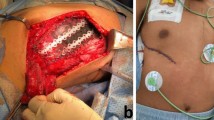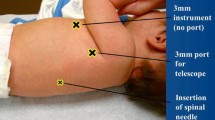Abstract
The authors report three cases of stage IV-S neuroblastoma in infants aged 4, 6, and 8 weeks, who despite chemo- and radiotherapy required surgical intervention to urgently relieve major thoracoabdominal compression secondary to massive hepatomegaly. The results were successful, with abdominal expansion being achieved by the introduction of a polytetrafluoroethylene prosthesis, which was removed during the 2nd, 3rd and 7th postoperative month, respectively, after tumor regression. Two children were in complete remission 32 and 38 months later, the 3rd died after 16 months of tumor progression.
Similar content being viewed by others
Author information
Authors and Affiliations
Additional information
Accepted: 23 February 1999
Rights and permissions
About this article
Cite this article
Mabrut, J., Dubois, R., Pelizzo, G. et al. Abdominal expansion using a polytetrafluoroethylene prosthesis in the treatment of Pepper syndrome. Pediatr Surg Int 16, 219–221 (2000). https://doi.org/10.1007/s003830050729
Issue Date:
DOI: https://doi.org/10.1007/s003830050729




